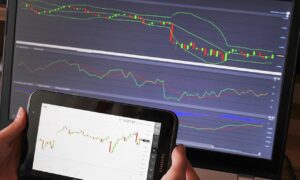A new wave of investment is quietly reshaping Thailand’s financial landscape. It isn’t happening on the bustling floor of the SET, but in the palms of millions, from the skyrises of Bangkok to the cafes of Chiang Mai. The confluence of a hyper-connected populace, post-pandemic economic realities, and the democratization of financial technology has ignited a powerful trend: the rise of mobile forex trading.
For a generation that came of age with smartphones, the leap from digital payments to digital investments is not just small; it’s intuitive. The forex market, once the exclusive domain of institutional banks and high-net-worth individuals, is now accessible with a few taps on a screen. This shift signals a fundamental change in how a growing number of Thais are approaching wealth creation and diversification. But as this digital gold rush accelerates, it brings with it a commensurate rise in risk, demanding a new level of financial literacy and caution.
The Digital Kingdom’s Fertile Ground
To understand the velocity of this trend, one must first appreciate the sophistication of Thailand’s digital infrastructure. The country is a truly mobile-first society. According to data from the World Bank, a staggering 90% of the Thai population was using the internet as of 2023. This deep connectivity has fostered a culture of digital fluency.
The groundwork was laid by systems like PromptPay, which revolutionized domestic payments and conditioned a massive user base to trust and manage their finances through mobile interfaces. The transition from scanning a QR code for street food to executing a trade on the EUR/USD pair became, from a user-experience perspective, remarkably fluid. The psychological barrier to entry was all but eliminated.
The Search for Alpha in a Shifting Economy
Technology provided the means, but economic drivers supplied the motive. Traditional investment avenues like the SET, real estate, and fixed-income instruments have faced their own set of challenges. The post-pandemic era, in particular, has accelerated a search for diversification. The desire to hold assets denominated in stronger currencies like the US dollar became a powerful hedge against local economic fluctuations.
This phenomenon is part of a broader regional trend. A recent capital market review by the OECD highlights the crucial need to offer households diversified investment opportunities. While the report focuses on broader market structures, its core message resonates at the individual level: households are actively seeking new ways to grow their capital beyond traditional means. The FX market, with its 24-hour nature and global scope, has become a primary beneficiary of this search for alpha.
The FinTech Disruption
The true catalyst has been the technology itself. Modern mobile trading applications have masterfully lowered the barriers to the FX market. The capital required to start has plummeted, with many platforms allowing users to begin with modest sums. Complicated charting software has been replaced with intuitive, even gamified, interfaces. Educational resources and demo accounts are often built directly into the apps. This 24/5 accessibility has transformed trading from a static activity into a dynamic part of daily life.
Navigating the High Stakes: Volatility, Leverage, and Regulation
However, this unprecedented access comes with significant, often underestimated, risks. The forex market is notoriously volatile. The same leverage that allows traders to control large positions with small amounts of capital can magnify losses just as quickly as it can amplify gains.
Furthermore, the digital nature of mobile trading has attracted predatory actors. This is where regulatory oversight becomes paramount. The BOT stipulates that all foreign exchange transactions must be conducted through authorized financial institutions. For a new investor, the single most important decision is not which currency pair to trade, but which platform to trust. The proliferation of choices makes rigorous due diligence essential. For those navigating this complex landscape, leveraging detailed brokers review in Thailand can serve as a critical starting point for identifying regulated and reputable partners.
The Future Horizon
The rise of mobile forex trading is not a fleeting trend. It represents a permanent evolution in how a digitally native generation in Thailand engages with financial markets. As technology evolves with AI-powered analytics and social trading features, its appeal is set to grow. This movement is creating a more financially engaged, globally-aware class of investors. Yet, it also underscores a pressing need for enhanced financial education. The mobile forex boom is a double-edged sword: a powerful tool for financial empowerment, but also a landscape demanding discipline, continuous learning, and a healthy dose of skepticism.



































